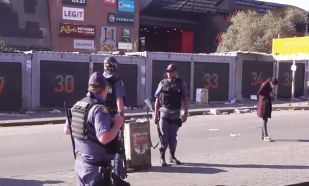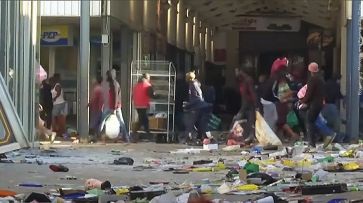An uneasy calm hung over South Africa after 25,000 army troops were deployed to assist police responding to unrest in the country. The social eruptions, riots, destruction of businesses and clashes with police began July 8 when former President Jacob Zuma started serving a 15-month prison sentence for contempt of court. “Supporters in his home province of KwaZulu-Natal set up roadblocks on major highways and burned about 20 trucks. The protests closed the N3 and N2 highways, which link the Indian Ocean ports of Durban and Richard’s Bay to the industrial hub of Johannesburg and to Cape Town,” reported themercury.com.

Redge Nkosi, who served in the presidential administrations of Nelson Mandela and Thabo Mbeki and is founder of Firstsource Money and executive director at Firstsource Holdings, said “protests” that damaged 161 malls and shopping centers, 11 warehouses, eight factories and 161 liquor stores and distributors are the culmination of discontent brewing for years.
South African dissatisfaction with what Nkosi called “economic apartheid” resulted in an estimated 10 billion rand ($680 million) in lost or stolen goods, burned trucks and destroyed property, reported the country’s Economist Intelligence Unit.
“This is a continuous protest … they have been erupting all over the country for years. So those of us who have been keeping tabs on what’s happening in the country are not at all surprised. People are so disgruntled with the system. However they cover any protest with what they call ‘service delivery protest,’ ”Nkosi said from his Pretoria office.
“To say South Africa hasn’t been protesting would be an incorrect statement when in fact South Africans have shown their dissatisfaction through protesting (for years), just not at the scale and level we’ve seen today.”
Nkosi believes calling demonstrations “service delivery protests” is the government’s way of downplaying growing national outrage.
South Africa recorded more than 900 service delivery protests in six months from August to January, according to Minister of Police Bheki Cele as Covid-19 did little to halt the demonstrations.

Over the last year there have been over 200 protests, Nkosi said. The Institute for Security Studies reported, “Last year warned that protests in South Africa are here to stay. The pandemic has exposed socio-economic weaknesses resulting from poor policy implementation and a fundamental failure of political leadership … many South Africans are giving up on democracy (with low voter turnout) but not on voicing their frustration through protests at a political elite believed to be out of touch with the plight of ordinary people.”
Nkosi believes getting to the root of the dissatisfaction requires revisiting two radically different economic approaches—the left-leaning Reconstruction and Development Program (RDP) and the current neo-liberal Growth Employment and Redistribution strategy (GEAR).
According to the Third World Network, “The RDP was introduced by the government of President Nelson Mandela in 1994 and contained measures such as free health care for pregnant mothers and children under six years of age. It also sought to aid poor Black families discriminated against during apartheid. However, the RDP was abruptly replaced by GEAR in June 1996. GEAR (created by the World Bank and the International Monetary Fund) focuses on attracting investment, trade liberalization, deficit reduction, abolishing exchange controls … .”
The Mandela administration surprised many by its willingness to open the domestic market to unequal foreign competition as was a requirement of the World Trade Organization, noted the Alternative Information and Development Center. South Africa’s longest running Minister of Finance Trevor Manuel said in a documentary, “I haven’t abandoned the RDP. We can very clearly debate (what) we’ve been able to deliver and remain … within the Freedom Charter.”
“Globalization is a fact. We need to recognize it as a fact and engage with it. It’s not going away,” he said.
This is speaking out of both sides of his mouth, commented Nkosi. Trevor Ngwane, a local councilor of Soweto, said in the documentary, “Money not reaching ordinary people, the money going to the rich … Quoting the Freedom Charter and RDP but not implementing these policies (as was done by Manuel) is wrong. Since people moved away from RDP to GEAR people have been suffering.”
Today under GEAR South Africa suffers from increased inequality including 74 percent youth unemployment. Current Finance Minister Tito Mboweni plans to cut and starve the economy to make Standard and Poors credit ratings agency and the International Monetary Fund happy. In a pandemic, he is cutting 50 billion rand (almost $3.4 billion) from the health budget and cutting more from education.
And Western corporate run media outlets can’t figure out why ordinary South Africans are outraged?













